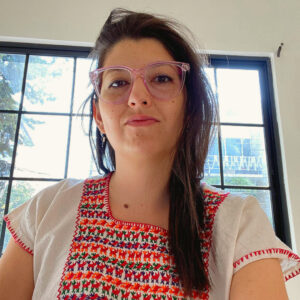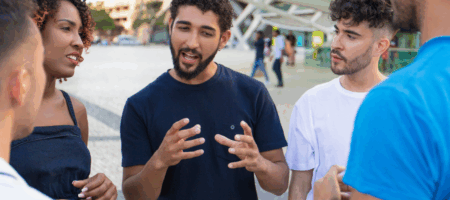With a long track record in managing research projects across Latin America, Diana Bueno Bieletto brings an interdisciplinary approach to her role as Associate Director at intO. In this interview, she tells us about her professional journey — spanning advertising, brand consultancy and research — and how she blends social psychology, trend hunting and data analysis to help global organisations understand complex local drivers and behaviours.
Hi Diana! You’ve recently joined Studio intO as our new Associate Director. Can you tell us about your professional journey so far and how it led you into research?
I studied Social Psychology and I was always interested in advertising’s ability to bring people together, especially when brands build a strong sense of community and belonging through ads. I was told Strategic Planning was the place for a social psychologist to be within an ad agency, so I eventually started working for a consultancy firm on strategic planning. It was during that time that I realised how important research is to obtain insights that come from actual people, instead of from a team of creatives at a desk imagining what people think of a brand.
After 7 years working at the strategic innovation firm, I joined an entertainment company where I helped them develop an Insights Unit, focused on getting to know audiences for concerts and festivals. However, because the entertainment industry was severely impacted by the Covid-19 pandemic, I ended up making the move to freelancing.
Working as a freelance researcher was a really great opportunity to do projects for different agencies and explore a variety of topics, which also led me to start publishing research articles and teaching at a University in Mexico.
How does your specialism in social psychology help you in your role as a researcher? Are there any specific skills or knowledge you get to apply when working in research projects?
In social psychology, we study people in context — we delve into phenomena that people experience everywhere (the global), but that have a certain meaning within a specific context (the local).
When I’m conducting interviews for an ethnographic study, for example, I always interpret the conversations I am having with participants through the lens of social phenomena; when I’m analysing their answers, I take into account the context they’re immersed in. Once I frame the responses of a particular person into a larger framework, I shape those insights in a way that can be applied to more people who share similar attributes.
Why do you think it’s important for global companies to understand the nuances of local context when conducting research – especially for innovation purposes?
Changing something means understanding it first, and we get to understand through research.
The companies we work with are powerful narrators. They get to tell inspiring stories about how they’re changing lives and societies, but this can only happen if the contexts where they operate are addressed correctly. This means they have to understand the global phenomenon they are referring to, as well as the local context in which it is taking place, and take a constructive stance on it.
People tend to relate to brands that offer products and services that address their specific needs and pain-points, and propose interesting solutions through a localised lens. Through research, organisations can connect with their desired audiences, which in turn can spark social change. For this, the insights provided need to capture users’ idiosyncrasies accurately.
What do you enjoy the most about working in research projects with companies from around the world?
What I enjoy the most is learning about new things. Getting to know new people and understand how they think, what frames their perspectives of the world. I also love having enough time to sit down and read responses that end up illustrating larger phenomena. If you pay close enough attention it’s like seeing the Matrix!
I’m fascinated by how the same topic can be addressed so differently by different people in different parts of the world or different ages. It makes me wonder about what makes us who we are.
What topics or contexts are you currently most interested in?
I really enjoy trends and new things emerging. I also feel passionate about talking to younger people and learning what their priorities and interests are, especially around music, tech and social media. I also enjoy delving deeper into what is expected from a specific section of society versus what they really want, like mothers and childcare or the elderly and technology.
You’ve worked on several projects across Latin American markets, including Mexico and Brazil very recently. Have you noticed any trends that could be interesting for companies looking to orchestrate research in those regions?
People want to be a part of something, they want to belong, to be closer to one another, especially after the pandemic.
From recent experiences doing research in South America, I’ve noticed that tribes are also on the rise; they’ve been there all of our lives, but the importance and strong bonds people with the same interests are building, is taking things to a new level now. The ViveLatinus project was a very illustrative example, where I got to explore how complex, intense and dynamic territories evoke different feelings in its inhabitants, focusing on four metropolises: São Paulo in Brazil, Mexico City in Mexico, Santiago in Chile and Buenos Aires in Argentina.
The role of social media, tech ecosystems, music and spaces where people meet IRL (like coworking spaces, parks, malls, housing, work) is something I would be very much interested in studying further.
My advice to businesses operating within any industry is to ensure they provide a space for people to connect. If you achieve this, your service or product, and overall your brand, will thrive.

Get in touch with Diana if you’d like to find out more about how intO can support your brand’s research ambitions.
Email her at: [email protected]
Connect with Diana on LinkedIn.
Explore our recent work.
Posted on April 24th, 2023
Research




